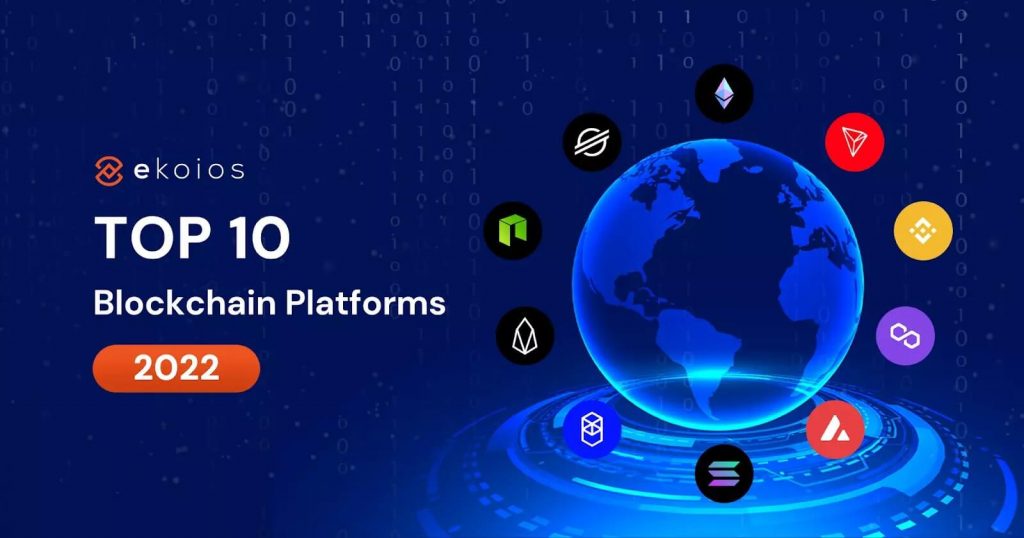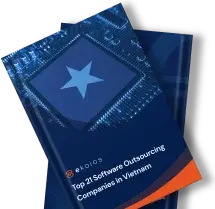Blockchain is a revolutionary technology that initially surfaced as a way to disrupt the financial industry. In the quest for a more secure and private way to manage finances online, it was the perfect answer. Nowadays, blockchain is being used in many different industries other than just finance thanks to its truly decentralized nature.
Consequently, we’re seeing the emergence of various blockchain platforms, each with its own unique applications, from data management to transaction processing. So if you’re looking to get in on the blockchain action, here’s a list of the top 10 most popular blockchain platforms (that we’ve developed hundreds of projects on) for your reference!
Before getting started, here are the definitions for the terminologies we’ll be using throughout the article:
- Total value locked (TVL): the total values of assets staked in a Defi platform’s smart contracts for transactional, borrowing, and lending capabilities.
- Transactions per second (TPS): Also known as the throughput rate, TPS is the maximum number of transactions that a blockchain network can process in a single second.
- Protocol: The fundamental rules that define how the blockchain platform is structured.
- Consensus mechanism: The method by which the peers of a blockchain platform come to an agreement on the current state of the data in the network.
Kindly note all platforms listed below are public – read more about public and private blockchains, definitions, and blockchain use cases here.
Ethereum (ETH)
Currently the No.1 platform by a long shot, Ethereum is intended to be much more than just a medium of exchange or a store of value. The decentralized platform establishes a peer-to-peer (P2P) network that securely executes and verifies application code called smart contracts – home to thousands of games and financial apps.
- Year founded: 2013
- Total value locked: $30.23 billion
- Transaction per second: 25
- Number of protocols: 25
- Consensus mechanism: On September 15th, Ethereum successfully kicked off the Merge – a shift from its original Proof-of-Work (PoW) consensus mechanism to a Proof-of-Stake (PoS) model.
- Programming languages: Solidity – the dedicated programming language for implementing smart contracts.
﹣
Tron (TRON)
Founded by a Singapore non-profit organization, Tron aims to host a global entertainment system for the cost-effective sharing of digital content. The platform utilizes the P2P network and blockchain technology to cut out the middlemen, letting content producers sell their products directly to customers.
Initially operated mainly in Asia, Tron has expanded globally, accumulating 50 million accounts as of August 2021.
- Year founded: 2017
- Total value locked: $5.32 billion
- Transaction per second: 2,000
- Number of protocols: 2,000
- Consensus mechanism: Delegated Proof-of-Stake (DPoS)
- Programming languages: Solidity
﹣
Binance Smart Chain (BNB)
Binance Smart Chain is a blockchain platform designed to help users manage their cross-chain digital assets with huge capacity and low latency. Compatible with Ethereum apps and parallel with Binance’s native Binance Chain BC, BNB users can enjoy both the high transaction capacity and the smart contract functionality.
- Year founded: 2015
- Total value locked: $5.22 billion
- Transaction per second: 45
- Number of protocols: 469
- Consensus mechanism: Proof-of-Stake Authority (PoSA), a hybrid between the Proof-of-Stake and Proof-of-Authority
- Programming languages: GO, Java, Javascript, C++, C#, Python, Swift
﹣
Polygon (MATIC)
Developed as a “layer 2” or “sidechain” solution for the Ethereum platform’s issue of traffic congestion, Polygon enables users to scale easily with high-speed and low-fee transactions. Said transactions will be handled on a separate blockchain, then return to the Ethereum chain for post-processing.
- Year founded: 2017
- Total value locked: $1.29 billion
- Transaction per second: 7,000
- Number of protocols: 309
- Consensus mechanism: Proof-of-Stake
- Programming languages: Solidity
﹣
Avalanche (AVAX)
As an alternative to Ethereum, Avalanche also uses smart contracts to facilitate a wide range of blockchain projects. The platform prioritizes speed and scalability, with an impressive TPS of 5,000 per second, backed by the parallel nature of its consensus mechanism. This superior ability has gained Avalanche the fifth position after just 3 years of launch!
- Year founded: 2020
- Total value locked: $1.6 billion
- Transaction per second: 5,000
- Number of protocols: 255
- Consensus mechanism: Proof-of-Stake
- Programming languages: Solidity
Solana (SOL)
Solana is another blockchain platform designed to host decentralized applications. Within this top 10 list (or even the entire industry), it boasts the highest TPS of 29,000, all while keeping transaction fees low! This is made possible through an innovative consensus model: combining a version of Proof-of-Stake synchronization with its own unique Proof-of-History algorithm.
- Year founded: 2016
- Total value locked: $1.28 billion
- Transaction per second: 29,000
- Number of protocols: 81
- Consensus mechanism: Proof-of-Stake and Proof-of-History
- Programming languages: Rust, C, C++
﹣
EOS
EOS is an open-source network that is based on the decentralized technology concept which offers the capability for the end-user to perform various tasks on the EOS platform. The platform carries out the Delegated Proof-of-Stake consensus algorithm and also has its own community forum, enabling developers to discuss their queries and applications.
- Year founded: 2018
- Total value locked: $110.27 million
- Transaction per second: 4,000
- Number of protocols: 22
- Consensus mechanism: Delegated Proof-of-Stake (DPoS)
- Programming languages: C++
﹣
NEO
The Neo blockchain platform uses blockchain smart contracts to manage digital assets which also facilitates the P2P exchange of digital assets and currencies without the demand to add third-party exchanges.
- Year founded: 2014
- Total value locked: $38.2 million
- Transaction per second: 10,000
- Number of protocols: 3
- Consensus mechanism: Delegated Byzantine Fault Tolerance (dBFT)
- Programming languages: C#, JavaScript, Kotlin, Python, Java, and GO
﹣
Stellar (XLM)
Stellar, a distributed ledger network under blockchain technology, furnishes a fast and cost-effective cross-border payment solution to business enterprises and individuals. Through the utilization of the stellar blockchain platform, building mobile wallets and smart banking tools like the Paypal online payment sphere is possible for developers.
- Year founded: 2018
- Total value locked: $23.25 million
- Transaction per second: 1,000
- Number of protocols: 3
- Consensus mechanism: Federated Byzantine Agreement (FBA)
- Programming languages: C++, Go, Java, JavaScript, Python, Ruby
﹣
Flow
Flow is the powerful blockchain platform behind some of the most popular applications in crypto, NFTs, and web3 gaming. Surely you’ve heard of CryptoKitties and NBA Top Shot? Designed for extensive scaling with native node subdivisions and without sharding techniques, Flow simplifies blockchain transactions, making them more speedy and cost-efficient.
- Year founded: 2020
- Total value locked: $3.68 million
- Transaction per second: 10,000
- Number of protocols: 2
- Consensus mechanism: Proof-of-Stake (PoS)
- Programming languages: Cadence
﹣
That’s a lot of information to process. So we’ve also prepared a summary chart for your convenience

Select a blockchain platform for your project
Each project, business, and industry has distinct needs when it comes to blockchain development, thus you’ll need some extensive research before making the decision. We suggest that you note down the project’s requirements for the following criteria, then cross-reference them with different platforms to find the best fit.
- Public or private
- Core functionalities
- Consensus mechanism
- Programming language
- Development tools
- Transaction speed (proven through TPS)
- Transaction cost
- Security
- Scalability
- Adoption rate & maturity
- Community & support
Wrapping up
Now that all the top 10 platforms have been covered, hopefully, you’ve gained a general idea of blockchain platforms and their versatile usabilities. While Ethereum remains the prominent host for projects and apps, revolutionary solutions are well on their way with outstanding performance (Solana’s TPS theoretically can reach up to 100,000!) and applications.
We also blaze through the questions you need to ask when selecting a platform for your next blockchain project. But if you’re still unsure and the readings seem endless, just leave it up to the experts! With 4 years of experience in blockchain development and 140+ successful projects, our team at Ekotek is confident to advise you on the optimal solution using the latest technology, and follow through with speedy and high-quality delivery.


